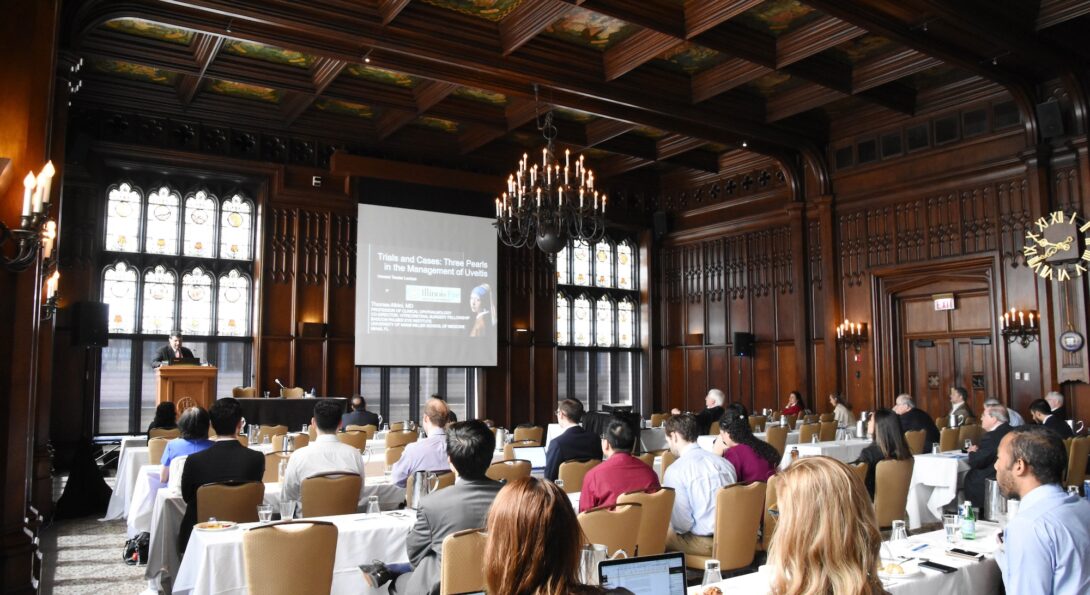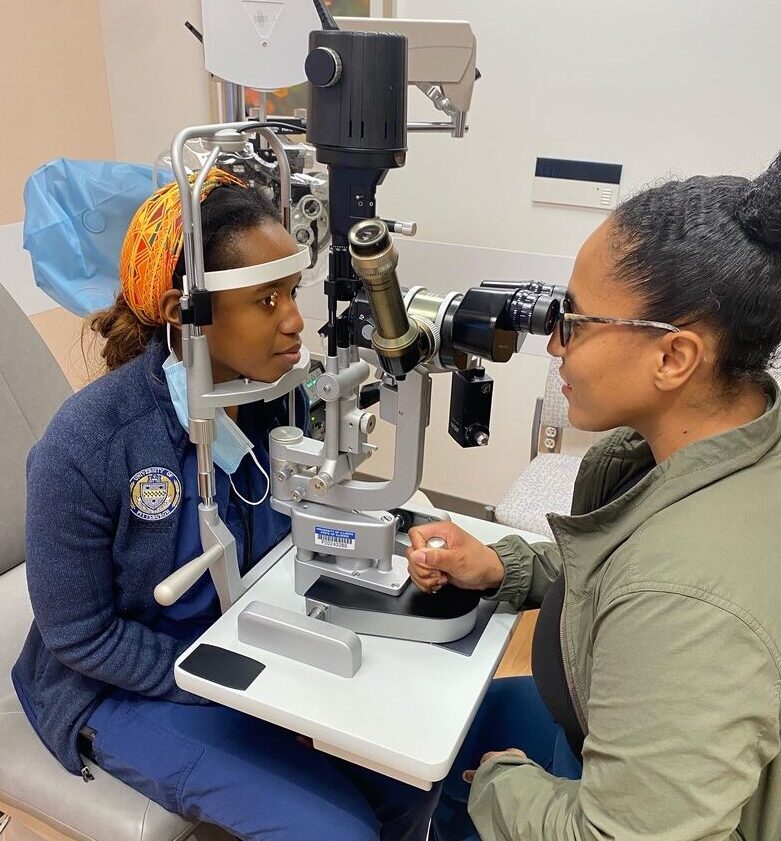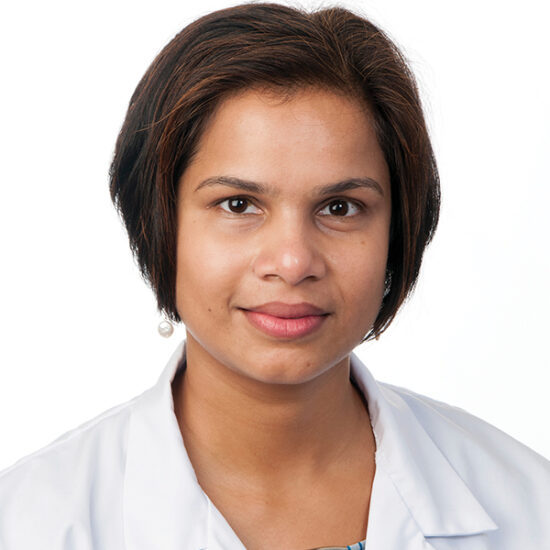Medical Students

The Department of Ophthalmology & Visual Sciences clerkships and medical student workshops
The educational goal of the Department of Ophthalmology is to provide medical students with core instruction in the principles of the ophthalmologic examination. This includes the initial evaluation of eye emergencies, ocular trauma and other vision-threatening diseases seen by the primary care physician. The basic eye examination is taught in small groups, emphasizing hands-on experience from skilled faculty examiners.
Clerkship Options Heading link
A four week career elective clerkship in Ophthalmology, for those interested in pursuing Ophthalmology as a career, is offered in the months of June, July and August. There is no maximum or minimum number of students for this clerkship. Requests for this clerkship are made with the Registrar’s office at the College of Medicine.
A four week non-career elective is offered to students pursuing other careers in Medicine. This elective has a maximum of 8 students and a minimum of 4 students and is offered from September to May.
Educational materials and events
Core reading materials are supplied to each student during their 4 week clerkships and a vast array of audiovisual materials are available to supplement the lecture series. Students are encouraged to attend all lectures and conferences, and may observe surgery in the operating room. In clinic, the students work up selected patients, under the supervision and guidance of both the resident and attending staff. These interactions enhance the learning and teaching process for both residents and students. At the completion of the rotation, a practical quiz is given covering the ophthalmologic examination. There is immediate grading and feedback, to maximize learning and allow students to address any questions.
links Heading link
Workshops Heading link
The department also has small-group workshops during winter for all M2 students as part of the Essentials of Clinical Medicine course. The workshop involves teaching by Faculty/Residents, the basics of ocular exam, dilated fundus and optic nerve exam, and clinical vignettes with discussions. Links to online instructional videos from the American Academy of Ophthalmology detailing ophthalmology examination including slit-lamp exams are provided prior to the small-group sessions and are mandatory viewing.
Student Instructions and Expectations Heading link
Schedule
The hours for the rotation are 9:00am-5:00pm Mon-Fri. Every day we will have some combination of clinic/surgery, lecture, video, and tutorials on various parts of the eye exam. All students receive lectures from different sub-specialty faculty. The students are given opportunities to spend time in the General Eye Clinic as well as in sub-specialty clinics of their choice.
Equipment
Having a hand held ophthalmoscope (regular or Pan-optic) is necessary for this rotation. These are not provided during the rotation. For those who did not purchase one during medical school, perhaps they can borrow one from their classmates who are on other rotations.
Reading material
Basic Ophthalmology, Essentials for Medical Students is a textbook from the American Academy of Ophthalmology. This is provided to each student while on the rotation and the book must be returned at the end of the rotation to receive grade completion.
Examination
A final exam consisting of approximately 50 questions is taken by all students at the end of the rotation and forms a portion of their grade.
Clinic
The students are given opportunities to spend time in the General Eye Clinic as well as in sub-specialty clinics of their choice. If a particular clinic is not in session you can always go to the operating room that day to watch anterior segment surgeries in room 19.
Daily journal
Students are encouraged to keep a journal throughout their rotation. At the end of each day, they can write down at least 5 items that they learned that day based on the video lectures, clinic experience, presentations, or tutorials.
Presentations
Every student is expected to prepare a power point presentation about ophthalmology as it relates to their chosen specialty. The presentation will all be given towards the end of the rotation and should include:
- The most important aspects of ophthalmology as it relates in their chosen specialty. If you have problems identifying a topic, please let the instructor know on the first day.
- The length of the presentation should be between 5 to 7 minutes with approximately 70% pictures/diagrams (videos up to 1 minute), and 30% word slides.
- The end of the presentation should include a summary slide.
Ophthalmoscopy Assessment: This will be based on a combination of the students’ performance in the clinic as recorded in the evaluation forms completed by residents/faculty, the presentation, journal entries and the final examination scores.
Illinois Ophthalmology Pipeline Heading link

A mentorship program for underrepresented in medicine (URiM)* medical students
The Illinois Ophthalmology Pipeline (IOP), is an active commitment to cultivating a medical community that reflects the rich diversity of its patient population and society as a whole. The IOP provides longitudinal resident and faculty mentorship to underrepresented in medicine (URiM)* medical students at the University of Illinois College of Medicine and supports them in becoming more competitive residency applicants.
The program provides immersive experiences into the field of ophthalmology with the goal of inspiring students to pursue this specialty early in their medical education. These experiences have included Clinical Skills Nights, Eyesi® Surgical Simulator events, suturing wetlabs, and shadowing opportunities with current residents and faculty in the clinic, operating room, and inpatient settings. Program mentees are also paired up with Department mentors who will offer continued guidance throughout their years in medical school.
*URiM medical students include Black individuals, Hispanic/Latinx individuals, and Native American individuals (American Indian, Alaskan Native, Native Hawaiian, and Pacific Islander).
Contact Heading link
If you have any questions regarding your upcoming elective or would like to pursue an elective with our department, contact the Director of Medical Student Education, Pooja Bhat, MD, pbhat@uic.edu. We greatly appreciate your feedback in making this elective more educational and useful for you. Enjoy the elective.
